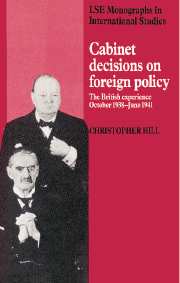Book contents
- Frontmatter
- Contents
- List of figures
- List of tables
- Acknowledgements
- Preface
- 1 Cabinets, foreign policies and case-studies
- 2 Constructing the Polish Guarantee, 15–31 March 1939
- 3 The Soviet question, April–August 1939
- 4 Entry into war, 1–3 September 1939
- 5 Reacting to the ‘peace offensive’, October 1939
- 6 To continue alone? May–July 1940
- 7 The longer term: War Aims and other committees, October 1940–June 1941
- 8 Decision-making in Cabinet
- Appendix 1 The Chamberlain Cabinet, 31 October 1938–3 September 1939
- Appendix 2 Attendance at the Foreign Policy Committee of the Cabinet, 14 November 1938–25 August 1939
- Appendix 3 Neville Chamberlain's statement in the House of Commons, 12 October 1939
- Appendix 4 Lord Halifax's paper for the War Aims Committee, October 1940
- Appendix 5 Anthony Eden's speech at the Mansion House, 29 May 1941 (extract)
- Notes
- Bibliography
- Index
- LSE MONOGRAPHS IN INTERNATIONAL STUDIES
2 - Constructing the Polish Guarantee, 15–31 March 1939
Published online by Cambridge University Press: 02 February 2010
- Frontmatter
- Contents
- List of figures
- List of tables
- Acknowledgements
- Preface
- 1 Cabinets, foreign policies and case-studies
- 2 Constructing the Polish Guarantee, 15–31 March 1939
- 3 The Soviet question, April–August 1939
- 4 Entry into war, 1–3 September 1939
- 5 Reacting to the ‘peace offensive’, October 1939
- 6 To continue alone? May–July 1940
- 7 The longer term: War Aims and other committees, October 1940–June 1941
- 8 Decision-making in Cabinet
- Appendix 1 The Chamberlain Cabinet, 31 October 1938–3 September 1939
- Appendix 2 Attendance at the Foreign Policy Committee of the Cabinet, 14 November 1938–25 August 1939
- Appendix 3 Neville Chamberlain's statement in the House of Commons, 12 October 1939
- Appendix 4 Lord Halifax's paper for the War Aims Committee, October 1940
- Appendix 5 Anthony Eden's speech at the Mansion House, 29 May 1941 (extract)
- Notes
- Bibliography
- Index
- LSE MONOGRAPHS IN INTERNATIONAL STUDIES
Summary
The first of our case-studies concerns reactions in the British government to the destruction of Czechoslovakia on 15 March 1939, an event which was a new departure for Hitler in that it went beyond his concerns with German national self-determination and laid bare a wider preoccupation with the strategic dominance of central Europe. It can also be seen as a turning-point in British foreign policy, in terms of both stripping the scales from Chamberlain's eyes and producing the obligation – in the shape of the Guarantee to Poland – which not only was to determine British involvement in the Second World War, but also ushered in that period of firm continental commitments which survives today, and which contrasts so sharply with the preceding centuries of British policy towards Europe.
The interpretation of the events of March 1939 is of course a matter of sharper historical controversy than this brief summary suggests. One school of thought tends to emphasise the elements of continuity between the new, pro-Polish, policy and previous British attempts, particularly after Munich, to pursue a policy of containment of Germany by trying to build up the economic and political strength of the small states to the east. The other principal approach stresses the abrupt nature of the change in British policy, and focuses on the practical as well as symbolic importance of implementing a commitment to Poland. Both schools naturally contain various refinements on the central theme, and each is cut across by divisions on the separate issues of the desirability and effects of the Polish Guarantee.
- Type
- Chapter
- Information
- Cabinet Decisions on Foreign PolicyThe British Experience, October 1938–June 1941, pp. 18 - 47Publisher: Cambridge University PressPrint publication year: 1991

